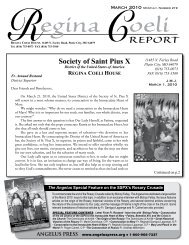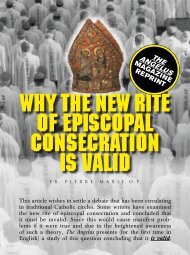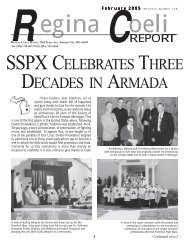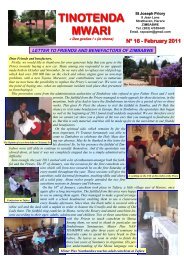Is Feeneyism Catholic? - Society of St. Pius X
Is Feeneyism Catholic? - Society of St. Pius X
Is Feeneyism Catholic? - Society of St. Pius X
You also want an ePaper? Increase the reach of your titles
YUMPU automatically turns print PDFs into web optimized ePapers that Google loves.
A NSWER TO OBJECTIONS 95<br />
<strong>of</strong> desire.” Thus Fr. Feeney or his followers were led to teach confusing<br />
things about the character <strong>of</strong> baptism.<br />
1. “The character is itself a sanctifying grace”! 133 The sacramental<br />
character is certainly a gift <strong>of</strong> God (grace, in its wide<br />
meaning), and it is useful for our sanctification (sanctifying), but<br />
the practice <strong>of</strong> the Church has been to reserve the combined appellation<br />
<strong>of</strong> sanctifying grace to a reality different from the character,<br />
and superior to it. To make a comparison, each divine Person<br />
is holy, and each one is a spirit, but the combined appellation<br />
“Holy Spirit–Spiritus Sanctus” has been reserved by the practice <strong>of</strong><br />
Our Lord and <strong>of</strong> the Church to signify the Third Person, not<br />
without deep reasons. Let us follow and respect the practice <strong>of</strong> the<br />
Church and avoid confusion. Thus in the context <strong>of</strong> sacramental<br />
theology, the above affirmation <strong>of</strong> Fr. Feeney’s followers is utmost<br />
confusion, in opposition to the common teaching <strong>of</strong> the Doctors<br />
<strong>of</strong> the Church!<br />
Bro. Robert Mary 134 in his response to the first edition acknowledges<br />
the correctness <strong>of</strong> the above, but falls into further<br />
confusion: “The character is a grace called gratia gratis data, an<br />
abiding disposition, freely given, which assists a mature <strong>Catholic</strong><br />
in his efforts to regain or increase in holiness.” Now the term gratia<br />
gratis data means the charismata, such as the gift <strong>of</strong> prophecy<br />
or <strong>of</strong> miracles: the character is certainly not such! Indeed charismata<br />
are not given to each and every Christian, but only according<br />
to the choice <strong>of</strong> God to a few, mostly some chosen saints. The<br />
charismata are not made for the personal sanctification <strong>of</strong> the one<br />
who has it, but for the common edification <strong>of</strong> the Church. On<br />
the contrary, the character <strong>of</strong> baptism is intended for everyone<br />
(everyone ought to be baptized), and it is for his own personal<br />
sanctification. I have never seen any theologian confusing character<br />
and charisma!<br />
2. The baptismal character is “the seal without which one is<br />
lacking the essential incarnational anointment marking him as<br />
heir <strong>of</strong> the heavenly kingdom.” 135 This is new theology, and not in<br />
133 “Reply to Verbum,” Res Fidei, February 1987, p.22.<br />
134 Op. cit., pp.192-103.











